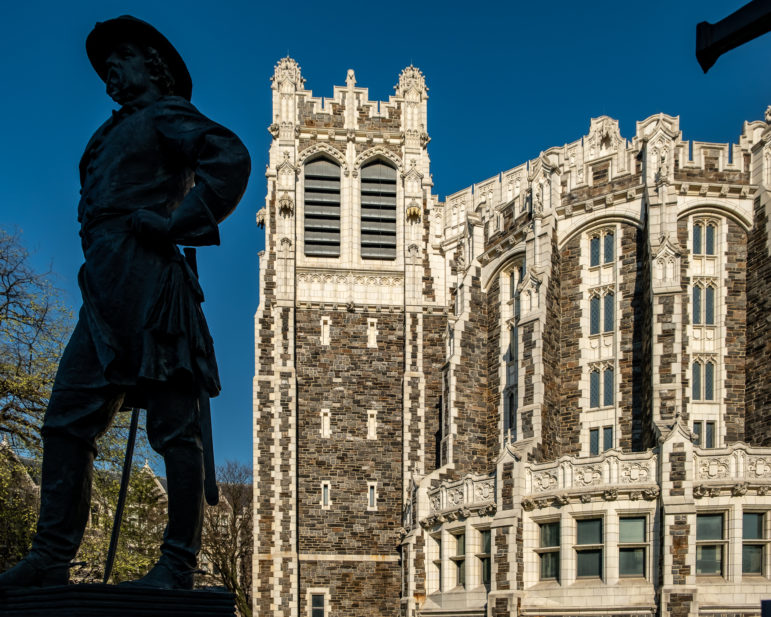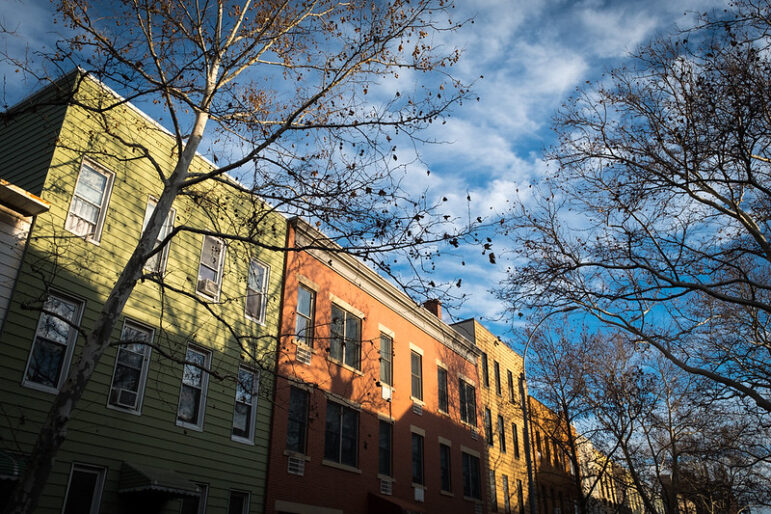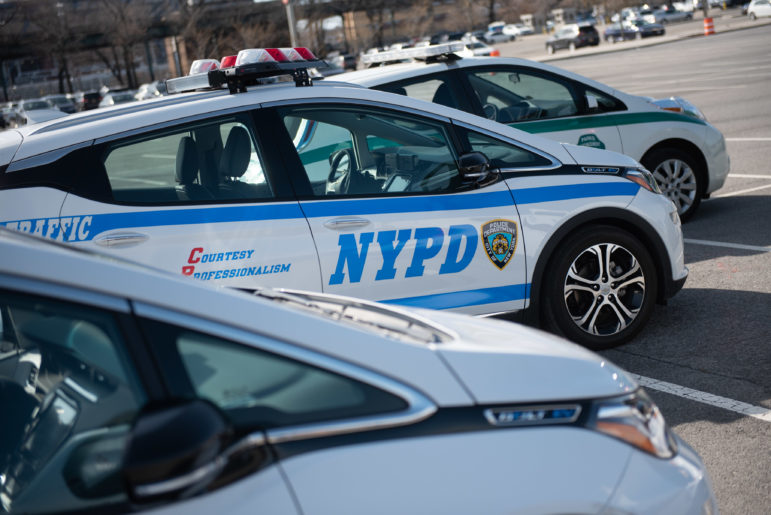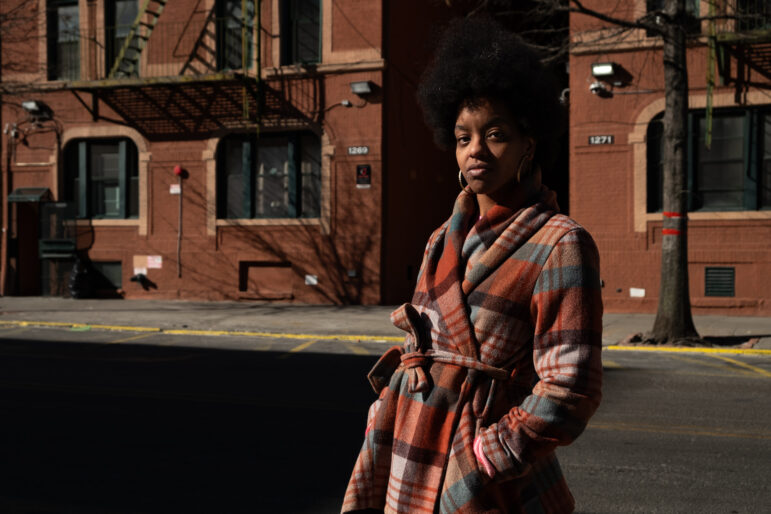
Adi Talwar
A mostly empty City College of New York campus on the evening of Tuesday April 7th. The City University of New York moved to distance-learning on March 19th for the remainder of the Spring semester to contain the spread of COVID-19.This story was produced as part of the City Limits Accountability Reporting Initiative for Youth (CLARIFY) program.
It’s been more than a month since most city colleges and universities, including those in the CUNY and SUNY system, moved to remote learning, many shuttering their dormitories in response to the COVID-19 crisis.
Students say they’re still adjusting to the change, tuning into video-conference classes and handing their assignments online. For many, the shift to life off-campus has meant dealing with more distractions at home, and missing the social interactions that came from class. It’s also raised questions and fears about the future, especially if quarantine measures carry forward into the fall. Some worry how it could impact their plans for internships and graduate school, while others are questioning whether their virtual classes are worth the tuition.
“I definitely feel the loss of not being with my classmates,” says Eve Kapassakis, a senior at St. John’s University. “Now that I’m in my room most of the day alone with my laptop and my books it definitely feels more empty and difficult.”
Like many students who spoke with City Limits, Kapassakis says she finds it harder to concentrate at home, especially “when so many bad things are happening in the world right now.” She worries how this semester will impact her overall GPA, something she says she worked hard for the last four years.
“It definitely wasn’t what I was expecting my last semester of senior year to be.”
More distractions, loss of in-person instruction
Schools are using different tactics to keep classes going during quarantine. Many are turning to video-conferencing software like Zoom for live virtual meetings, while other professors record their lectures ahead of time for students to watch online. And though most students say teachers and administrators are doing their best, many feel they’re losing out on something by not having face-to-face instruction.
“My professors definitely are trying to make this easier for us and I feel bad because this is difficult on them too,” says Kapassakis. “Our classes are mostly running smoothly but the most difficult part is not being able to go to my professors’ office and ask questions and clear up issues in person.”
Jillian Bleier, a freshman majoring in documentary studies and production at Ithaca College, is taking a photography class, but is now confined to taking pictures in and around her home in Ontario County, where she returned after her dorm was closed in mid-March. Students initially expected to be able to return to campus after spring break, leaving books and other campus equipment behind that they’re now unable to access.
“Not being able to interact with classmates in person makes it harder to collaborate on projects and changes the entire feel of the class,” she says. “Communicating with professors solely online feels kind of forced at times and is a missed opportunity for connections and networking.”
“I prefer in-person classes because I feel we just get a better sense of our environment and discussions,” echoes Sayeba Hossain, an 18-year-old freshman studying journalism and communications at LaGuardia Community College. She believes that loss impacts more than just the academic lives of students, as isolation has begun to take its toll.
“I think not having to get up and go on campus somehow made me feel like college is an option but it’s not,” she says. “Going to class gave us a schedule and sense of normality.”
Impact on mental health
Kazi Maisha, 19, is a sophomore at CUNY City College, where she also volunteers as a campus crisis counselor—work in which she says she’s witnessed firsthand the anxiety college students are experiencing as a result of the pandemic.
“Many of them are just upset at how it’s affected their daily lives, she says, adding that she’s found the “most effective coping technique is finding indoor alternatives,” to the activities students used to enjoy, such as working out at home in lieu of the gym.
Sheniqua Roberts, a sophomore majoring in media studies at Hunter College, says the turmoil this semester is definitely taking its toll on her mental health. She had been living at Dorm Project housing at City College until those dorms were closed abruptly in March, giving her just a day to move out.
She’s now staying on campus at Queens College, where CUNY made dorms available to students evicted from other CUNY campuses who had nowhere to stay, but is unsure of how long the arrangement will last or where she’ll be living after this semester ends.
“I really don’t know what’s gonna happen,” the 26-year-old says. While Hunter gave students a week off for professors to make the transition to online, students still had work due, and Roberts is also employed part-time doing youth outreach. Between balancing her job with her schoolwork, she says she is on her laptop all day.
“I really didn’t get a break,” she says. “Honestly I’m not taking care of mental health. It probably is a good idea to practice things for my mental health, but honestly I’m still in shock.”
Other students say online learning works best if instructors are understanding and upfront about its challenges, making an effort to connect with students and being more flexible around assignments and deadlines.
“I find courses where professors are using Zoom more often and making themselves available to students beyond their office hours to be very effective,” says Brenika Banks, a sophomore majoring in journalism and creative writing at Baruch College. “I just hope professors are very understanding when it comes to grading courses this semester.”
Unsure of the future, changing plans
But students’ worries about the impact of coronavirus extends beyond just this semester, with several saying the pandemic has raised questions about how their academic careers will proceed in the future, since it’s still unclear when in-person classes might be safe to resume.
Shahrukh Khan, 26, a senior majoring in chemistry at City College, says online lab classes aren’t really a substitute for hands-on learning.
“You’re literally losing skills. Watching a video isn’t the same as doing it. It’s night and day difference,” he says. He’d been planning to apply to PhD programs but isn’t sure how that will work under the current conditions.
“How’s that gonna be administered?” he asks. “[The] application processes for higher fields seem iffy right now.”
Nikki Chati, a 19-year-old studying biochemistry at SUNY Stonybrook University, says she’s worried about how the crisis will impact her plans to apply for medical school to become a doctor, as much of the hands-on experience she’ll need to prepare is out of the question for the foreseeable future.
“I was going to use this summer to volunteer at hospitals and nursing homes, as well as shadow doctors,” she says. She’s now considering taking a gap year, pausing her studies at some point so she can spend that time making up the clinical work experience she’ll be missing out on now.
Bleier, who attends Ithaca College, says her school has suspended it study abroad program until at least the fall of 2021, pushing her own plans to do so back.
“I think many students are worried about this situation carrying over into the next semester,” she says, saying she has friends who are also considering taking a gap year if online instruction is extended into the 2020-2021 school year, or switching to another less expensive college.
“One of my friends has considered transferring if this is the case, since paying a private tuition may not be worth it to her for online classes,” Bleier says.









One thought on “For NY’s College Students, Remote Learning Brings Distraction and Uncertainty of What’s Next”
nice post like it